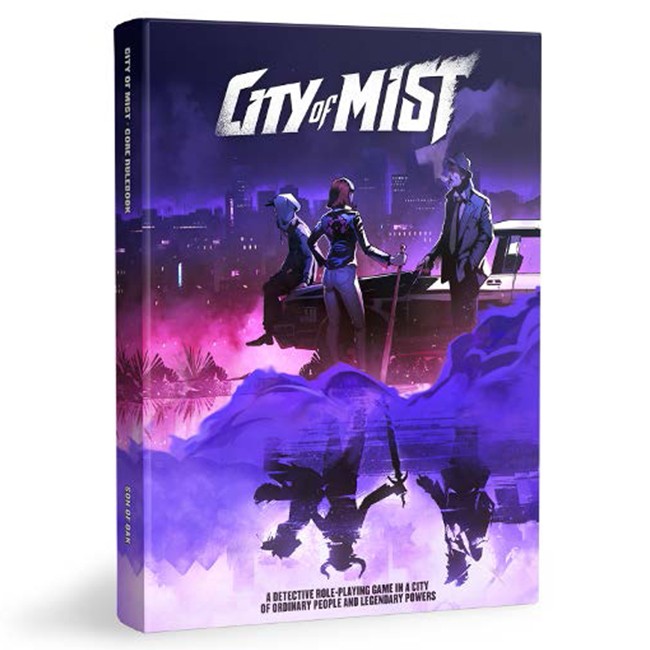City of Mist
My choice for this month takes me away from the classic cardboard to the engine of the mind - my favorite Role Playing Game, City of Mist! This game employs the powered-by-the-apocalypse system using two classic 6-sided dice rather than a set of polyhedral dice. It features a modern setting, complete with cell phones, large corporations, and all the modern amenities (and problems) of the 21st century, while also bringing in a fantasy element of supernatural abilities.
GAMEPLAY
You and your crew of fellow super-power-imbued buddies set out into The City at dusk, watching as the familiar tendrils of The Mist wind their way down alleyways and around the towering skyscrapers of downtown. The ubiquitous neon lights pierce the oncoming haze as you make your way to the latest crime scene, a vision of chaos reeking of a supernatural culprit.
It is up to you to find new clues, track down leads, and eventually confront the cryptid/ super-criminal/ embodiment-of-an-old-God responsible for the misdeeds around town! The noir element of this game really draws you in, and is a theme carried throughout the various actions you can take and the nature of the design for the characters and cases included in the Core Book.
The source of your abilities take the form of Tags, which are vague, one-word or short-phrase descriptions of your normal skills, character quirks, and super powers that you create yourself, and are added to relevant dice rolls. You’ll have Tags from super-natural-related sources, and Tags from the more mundane, day-to-day life sources, too. For example, my character might want to Convince a witness to tell me what they know about a suspicious character, so I might invoke the Tag “Empathetic,” and also “Hypnotic Gaze,” adding +2 (one for each Tag) to my roll and check for success.
REVIEW
While the system of the game is not quite what I would describe as intuitive, it is quite engaging. Once you get past the learning curve, the game really opens up in a lot of fun ways. The use of Tags over more traditional “stats” for your character leaves a lot of ambiguity and creativity for you to play with, and the Player Moves are very cinematic in nature. The game design skews away from what I consider crunchy, like the more number-heavy RPGs, and more towards open interpretation and story-building as a group.
Given the nature of the intentional ambiguity of which Tags apply to which situations, you’ll have to bargain and negotiate with your fellow players. This is not a bad thing by any means. Justifying the application of your various skills and abilities puts you in the shoes of you characters in a really unique way, and adds to the overall immersive ambiance of the game.
If you enjoy RPGs, or you’re looking for a new experience, I highly recommend it! See you at the (virtual) table!
